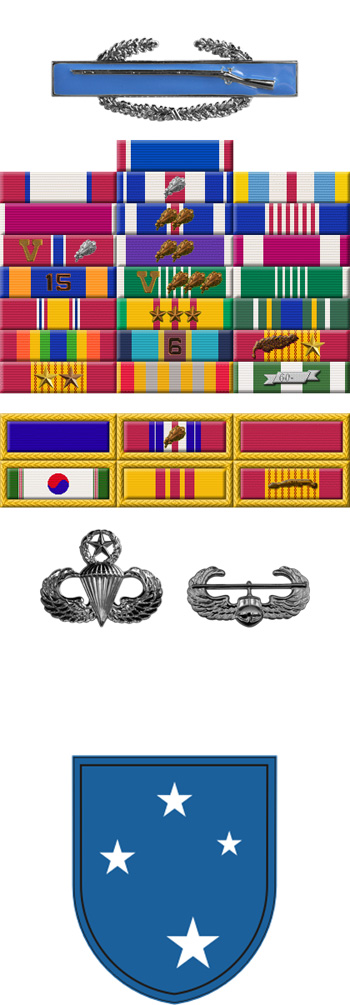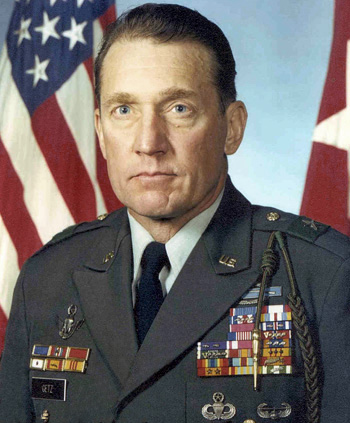
|
Charles E. Getz |
 |
|||
| Rank, Service | ||||
Brigadier General O-7, U.S. Army |
||||
| Veteran of: | ||||
|
||||
| Tribute: | ||||
Charles Getz was born on August 1, 1936, in California. He entered the U.S. Military Academy at West Point on July 5, 1955, and graduated with a commission as a 2nd Lt of Infantry on June 3, 1959. After completing the Infantry Officer Basic Course, Airborne School, and Ranger School, Lt Getz served on Operation Winter Shield II with the 34d Infantry Division in West Germany from July 1960 to November 1961, followed by service as executive officer for Company B, 1st Brigade, 30th U.S. Infantry in West Germany until June 1962. His next assignment was with the 10th Special Forces Group in West Germany from June 1962 to August 1964, and he then completed the Infantry Officer Career Course at Fort Benning, Georgia, in June 1965. Capt Getz next served as commander of Company L, 2nd Training Regiment at Fort Dix, New Jersey, from June 1965 to July 1966, followed by service in Southeast Asia as commander of Company B, 2nd Battalion, 8th Cavalry Regiment, 1st Cavalry Division in South Vietnam from July 1966 to July 1967. Maj Getz served with the U.S. Army Infantry School's Ranger Department at Eglin AFB, Florida, and Fort Benning, from September 1967 to August 1969, followed by Air Command and Staff College at Maxwell AFB, Alabama, from August 1969 to June 1970. He then deployed to Southeast Asia for a second tour, first as executive officer of the 196th Infantry Brigade from July to October 1970, and then as commander of 1st Battalion, 52nd Infantry Regiment from October 1970 to July 1971. Col Getz next served on the staff of U.S. Army Pacific at Fort Shafter, Hawaii, from September 1971 to April 1973, and then on the staff of Headquarters U.S. Army in the Pentagon from May 1973 to July 1974. He attended National War College in Washington, D.C., from July 1974 to June 1975, and then served on the staff of the 82nd Airborne Division at Fort Bragg, North Carolina, from June 1975 to December 1976. His next assignment was as commander of 3rd Brigade, 82nd Airborne Division at Fort Bragg from December 1976 to September 1978, followed by service as assistant chief of staff with Headquarters XVIII Corps at Fort Bragg from September 1978 to July 1979. He served another tour with Headquarters U.S. Army at the Pentagon from July 1979 to August 1980, and then served as assistant deputy chief of staff for operations and plans for U.S. Army Forces Command at Fort McPherson, Georgia, from August 1980 to May 1982. Gen Getz next served as chief of the Joint U.S. Military Assistance Group in the Philippines from Junst 1982 to August 1984, followed by service as assistant commander of the 2nd Infantry Division in South Korea from August 1984 until his retirement from the Army in August 1987. |
||||
|
||||

